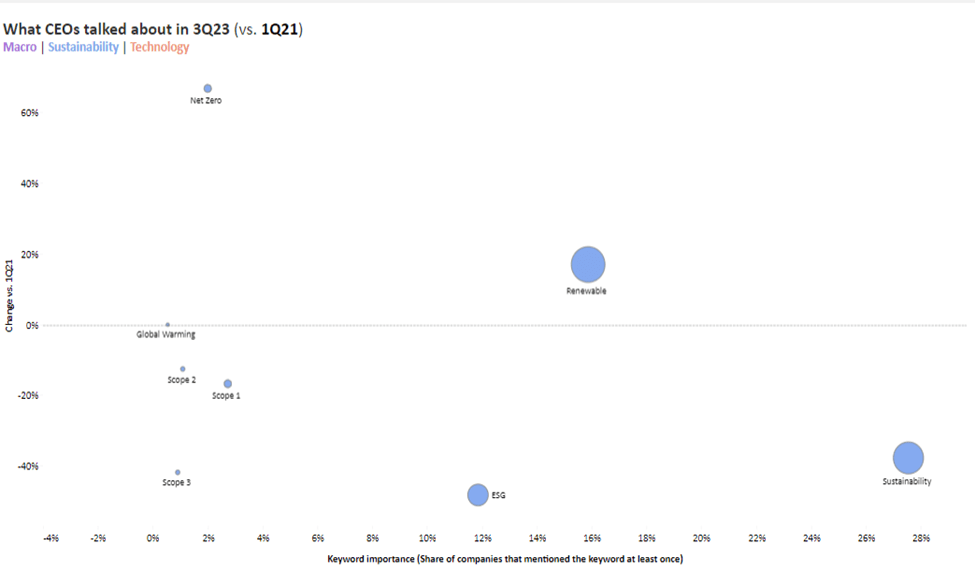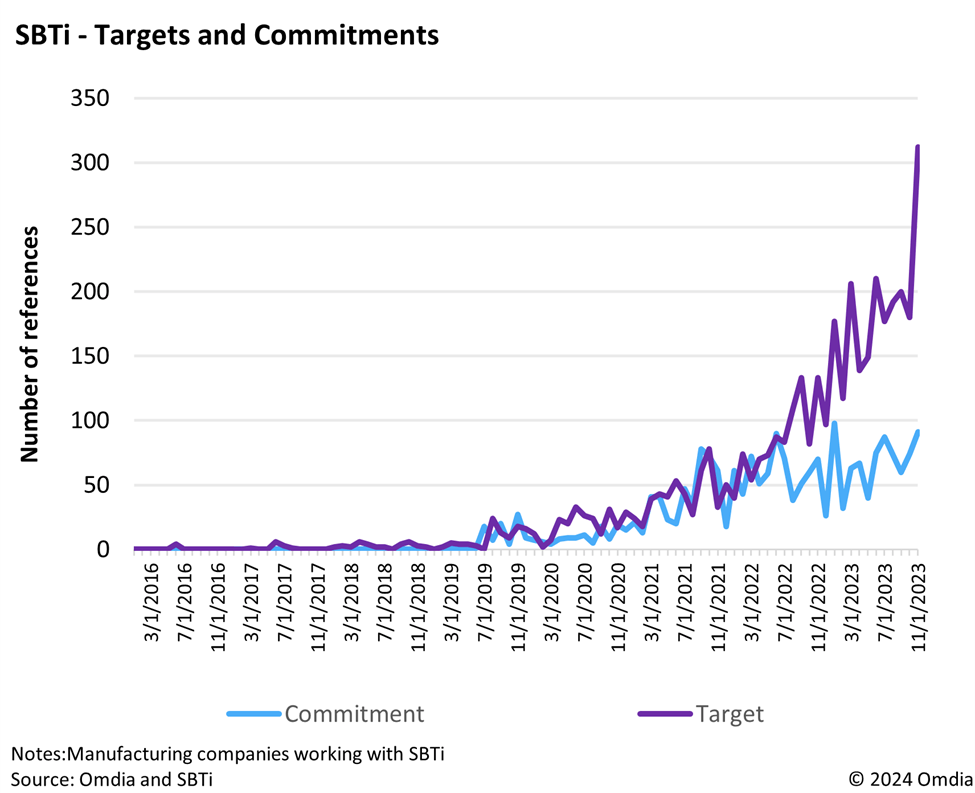In the words of Maurice Switzer in Mrs. Goose, Her Book: “It is better to remain silent at the risk of being thought a fool, than to talk and remove all doubt of it.”
Sometimes less is more – and that is proving to be the case when it comes to ESG reporting of manufacturing companies. The days of widespread, yet often meaningless sustainability rhetoric is giving way to less prevalent but more meaningful discussion and claims on the topic. This is especially true at the board level of industrial companies.
Recent Omdia analyses, spanning from the first quarter of 2021 to the third quarter of 2023, of earnings calls from 550 manufacturing firms, reveal a marked reduction in the mention of 'sustainability' and 'ESG' by 38% and 48%, respectively. This decline is mirrored across various sustainability-related terms, indicating a broader shift in discourse.
Source: Omdia
From Greenwashing to Greenhushing
The manufacturing sector has been historically marred by questionable reporting practices including selective reporting and inconsistent adherence to methods and standards.
However, the pressure on companies to improve reporting is growing.
- Legislation:
Initiatives like the EU’s Corporate Sustainability Reporting Directive (CSRD), the SEC’s Climate Disclosure rule in the U.S., and China’s new ESG disclosure rules are setting a higher bar for environmental impact reporting. Alongside new regulations on reporting, companies are also being challenged about false or unsubstantiated green claims. In January, the EU parliament introduced “The Greenwashing directive” outlawing generic environmental claims and other misleading product information and requiring sustainability labels to meet certification schemes or established by public authorities.
- Litigation Risks:
The consequence of failure to report or misreporting are also becoming more severe. In the EU, member states are setting their own consequences for companies failing to adhere, with France having introduced up to five years of jail time and €75,000 fine for directors if they don’t present the necessary information for certifying CSRD reports by external auditors. A two-year jail term and €30,000 fine is in place for simply failing to have a certified auditor check a company’s CSRD report.
- Stakeholder Expectations:
With companies now being required to report both performance and progress to sustainability targets, how and what companies report is being scrutinized. Long term pledges (without immediate action), an over-reliance on the, often questionable, practice of carbon offsets, exaggerated or misleading claims etc., are being exposed and resulting in damage to brand reputations as well as legal challenges.
Don’t confuse less talk for inactivity
The dampening rhetoric does not reflect diminishing efforts. Almost half of the ~6,500 manufacturing companies that have aligned to Science Based Targets initiative (SBTi) for emissions reporting were made in 2023 alone.
There has also been a major uptick in the proportion of companies setting SBTi based targets (time-bound goals) rather than commitments (general statements of intent).
European companies have chiefly led this trend, accounting for 50% of companies setting science-based targets and over half of these manufacturing companies were in consumer-facing sectors, such as food and beverage, where public pressure is highest.
From opportunistic to strategic sustainability
Unfortunately, despite a substantial increase in target setting, for many manufacturers, these targets reflect a step in the journey rather than the end goal. Nearly 80% of targets that have been set refer to emissions reductions of 50% or less, whilst only 13% of companies have set complete net-zero targets. Similarly, 91% of companies have set targets for 2032 or earlier.
There are many quick wins that can make a small impact but are a distraction to meeting long term goals. The “last mile” will undoubtedly be the hardest.
However, it is important for companies not to “sacrifice their future on the altar of immediacy” in search of short-term wins that may appease stakeholders in the near term while doing little to address the long-term goals and challenges.
As Mark Twain said, “Action speaks louder than words but not nearly as often.”
So, as we move forward, not only should conversation be replaced with action, but the quality of that action will also need to be closely monitored.
For more Omdia research covering market trends and industry forecasts prepared by analysts in Omdia’s Manufacturing Technology practice, click here.
More from author
More insights
Assess the marketplace with our extensive insights collection.
More insightsHear from analysts
When you partner with Omdia, you gain access to our highly rated Ask An Analyst service.
Hear from analystsOmdia Newsroom
Read the latest press releases from Omdia.
Omdia NewsroomSolutions
Leverage unique access to market leading analysts and profit from their deep industry expertise.
Solutions







